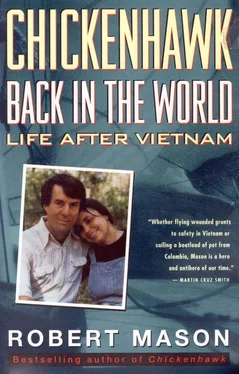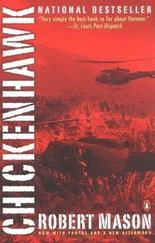Robert Mason - Chickenhawk - Back in the World - Life After Vietnam
Здесь есть возможность читать онлайн «Robert Mason - Chickenhawk - Back in the World - Life After Vietnam» весь текст электронной книги совершенно бесплатно (целиком полную версию без сокращений). В некоторых случаях можно слушать аудио, скачать через торрент в формате fb2 и присутствует краткое содержание. Год выпуска: 2013, Издательство: BookBaby, Жанр: Старинная литература, на английском языке. Описание произведения, (предисловие) а так же отзывы посетителей доступны на портале библиотеки ЛибКат.
- Название:Chickenhawk: Back in the World - Life After Vietnam
- Автор:
- Издательство:BookBaby
- Жанр:
- Год:2013
- ISBN:нет данных
- Рейтинг книги:3 / 5. Голосов: 1
-
Избранное:Добавить в избранное
- Отзывы:
-
Ваша оценка:
- 60
- 1
- 2
- 3
- 4
- 5
Chickenhawk: Back in the World - Life After Vietnam: краткое содержание, описание и аннотация
Предлагаем к чтению аннотацию, описание, краткое содержание или предисловие (зависит от того, что написал сам автор книги «Chickenhawk: Back in the World - Life After Vietnam»). Если вы не нашли необходимую информацию о книге — напишите в комментариях, мы постараемся отыскать её.
Chickenhawk: Back in the World - Life After Vietnam — читать онлайн бесплатно полную книгу (весь текст) целиком
Ниже представлен текст книги, разбитый по страницам. Система сохранения места последней прочитанной страницы, позволяет с удобством читать онлайн бесплатно книгу «Chickenhawk: Back in the World - Life After Vietnam», без необходимости каждый раз заново искать на чём Вы остановились. Поставьте закладку, и сможете в любой момент перейти на страницу, на которой закончили чтение.
Интервал:
Закладка:
That night we kept in sight of the land lights from Puerto Rico and then Saint Croix, working our way toward the Anegada Passage between Virgin Gorda and Sombrero Island.
A huge Lykes freighter came within a mile of us and John hailed it on the radio, requesting a position check. Their loran worked. The radio operator told us our position. John checked the chart. We would make the passage by dawn, if we didn’t get stopped.
CHAPTER 18
The sea changed when we sailed through the passage, as though we had entered a different land. The difference was more a coincidence of weather than a geographical change. The wind was dying, and the Atlantic was filled with huge swells instead of the choppy seas of the Caribbean. We felt good. Not only was it New Year’s Eve 1981, but we’d gotten across the Caribbean, past the pirates, into the Atlantic. The Caribbean was small, constraining—hell, it had only taken us five days to cross. The Atlantic was wide-open territory—home country, it seemed. We headed due north, away from all land, far away from the usual traffic, and, we hoped, far away from the Coast Guard. That night we broke out a bottle of Cruzin rum and had a party. It was the first hard stuff I’d drunk in four years. Two drinks made me stagger. I was reminded of earlier days and I didn’t like it.
I wasn’t living without aids on this trip—I just wasn’t drinking. I was smoking pot every day. Marijuana made me feel comfortably lazy. It was meditative, relaxing. It was a crutch, but I still needed one. So far, it was working. The physical exertion on the trip and not drinking were actually making me fitter than I’d been in years. I was sleeping better at sea than I ever had on land. I could really get into this sailing life if Patience could overcome her seasickness.
The radio traffic between us and the scam master was now a daily routine. Management wanted to know where we were every day. The calls usually came at night, when the reception on the single-sideband radio was best. John and the scam master, Dave, traded part numbers and other ersatz figures in the coded conversations. John estimated that we’d be arriving at the drop-off point in two weeks, somewhere around the fifteenth of January. I couldn’t get used to how long things took on a sailboat. In Vietnam, I used to give ETAs (estimated time of arrival) like, I’ll be over your position in thirty-five minutes. Sometimes I’d have ETAs of three hours on long flights from An Khe, in the boonies, to Saigon, say. Two weeks? Sailing is slow. Baseball is faster.
The first week on the Atlantic was uneventful. The sea was beautiful and shipping was scarce. The Namaste cut through the smooth sea unhindered, making six and seven knots. I spent most of my time sitting against the cabin on the foredeck writing in my notebook. Memories of what I’d done in Vietnam came to me at odd moments and I’d write them down. Something I’d seen or smelled or heard jogged the memory into existence. This phenomenon really fascinates me. How is it that you can know you know something if you can’t remember it? It would seem you either know it or you don’t. An example given to show how great a computer the brain is, is this question: What is the population of Nepal? You will probably, unless you live there or know the example, say you don’t know. The question is, then, how did you know so fast that you didn’t know it? A standard business computer, given the same question, cannot know it doesn’t know the answer until it has done an exhaustive search of its data base. Somehow, people know they don’t know something right away. I was reading about future technologies that would allow computer memories to more closely match the architecture of brains and be capable of knowing what they know very fast. These new kinds of computers wouldn’t be programmed, they’d learn. They were to be electronic rather than biological brains. This proposed system was called neural networking, which meant that the construction of the electronic brain was patterned after the neural patterns of our own brains. I decided that the robot I was building for my novel would use this technology.
I wrote down ideas about my robot. I jotted down short titles for the things I remembered about Vietnam. My brain ran a search while I was crewing a sailboat smuggling thirty-five hundred pounds of marijuana into the United States.
I wrote, “Daisy gets the Distinguished Flying Cross.”
Captain Daisy, the chicken pilot who hid behind his armor during the assaults, was also the awards officer. They’d lined us up for the monthly awards ceremony. We stood in vague ranks wearing loose jungle fatigues, shifting around like squirmy kids. Pilots hate formations more than shiny boots.
We all got air medals. You got one for every twenty-five hours of combat flight time you logged, the same as did the pilots in World War II. I had five or six by now. Got another one. Then the major and the executive officer got to Daisy. The major started reading his citation, and as he got into it, we started looking at one another. This was not going to be a fucking air medal.
Tom Schall, Daisy’s usual copilot, said, “I was with him on that flight. Fucker disappeared behind his chicken-plate.” The executive officer looked up and glowered. Schall just glared back. Schall wasn’t afraid of anyone, especially the exec. Besides, assault pilots could do just about anything they wanted; they needed us. The major read on about how Daisy had flown a lone ship into LZ X-ray during the battle of la Drang Valley. He flew against a hail of bullets, the major read. He picked up some wounded grunts and saved their lives. What? We’d all been there. No one knew what the major was talking about. Daisy’s own copilot didn’t know what the major was talking about. Everybody knew Daisy hid behind his chicken-plate when the bullets started flying.
When the major finished and we saw he was actually going to pin the DFC on Daisy’s chest, the highest award for valor in the air, the formation broke ranks. Everybody just walked off, muttering nastily. The exec officer yelled, ordered us to come back. Nobody did.
During our second week in the Atlantic it began to get cold. We were back in the northern latitudes and the balmy tropics were just memories. Each day we put on more clothes: from bathing suits to shirts and jeans to sweaters and then insulated jackets. I was no longer able to sit out front and write. I hung around under the dodger instead. As it got colder, the sea grew rougher. The skies were overcast most of the time, making sighting the sun for navigation impossible. We sailed for days at a time without knowing our position.
Days blended together. Each morning looked the same as the morning before. For as far as we could see, all around us, was the horizon. Every day it was the same horizon. Sailing out of sight of land reinforces the fact that we live on a ball in space. You can see the curvature of the earth. At night, if it was clear, the stars looked like they were sitting right there next to me and it seemed that we weren’t moving at all. South Sea islanders believed, as they traveled across hundreds of miles of open sea, that the boat wasn’t going anywhere. Their destination would come to them if they made the right moves. Sitting on the edge of space, alone with the stars, it was easy for me to see where that idea came from.
As we got closer to the States, we got jumpy. Bob dropped his Spanish routine. John was drinking heavily. I smoked pot, made notes in my journal, invented ever more efficient programs to run on my calculator to automate navigation calculations.
We were in common shipping lanes now. We saw as many as half a dozen ships every day, any one of which could’ve been a Coast Guard cutter. I began to think that the chances of sneaking past the Coast Guard were slight. We could hear the Coast Guard on the radio, talking to the freighters, asking them if they’d seen any unusual traffic. Small sailboats in the winter Atlantic are unusual traffic. We kept our binoculars glued on every ship we saw appear on the horizon, breathing sighs of relief when we didn’t see the big red hash stripe the Coast Guard had painted on its ships. The vigil was making us tense as snakes.
Читать дальшеИнтервал:
Закладка:
Похожие книги на «Chickenhawk: Back in the World - Life After Vietnam»
Представляем Вашему вниманию похожие книги на «Chickenhawk: Back in the World - Life After Vietnam» списком для выбора. Мы отобрали схожую по названию и смыслу литературу в надежде предоставить читателям больше вариантов отыскать новые, интересные, ещё непрочитанные произведения.
Обсуждение, отзывы о книге «Chickenhawk: Back in the World - Life After Vietnam» и просто собственные мнения читателей. Оставьте ваши комментарии, напишите, что Вы думаете о произведении, его смысле или главных героях. Укажите что конкретно понравилось, а что нет, и почему Вы так считаете.












